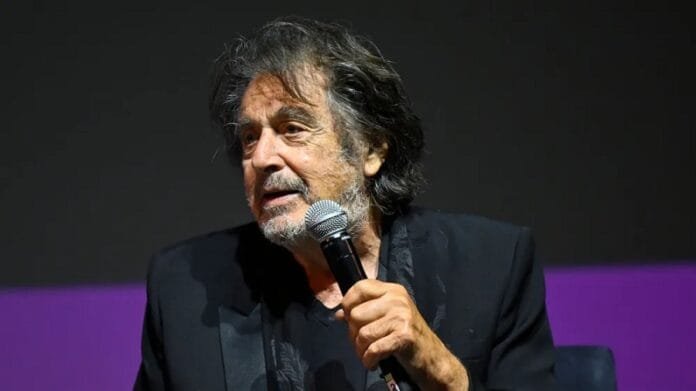In a candid conversation with The New York Times ahead of the release of his memoir, Sonny Boy, legendary actor Al Pacino opened up about a terrifying near-death experience during the early days of the COVID-19 pandemic. Pacino, renowned for his roles in iconic films like Scarface and The Godfather, shared how a severe bout of the virus left him on the brink of death and how it has altered his perspective on life and mortality. His experience is not just a personal reflection on survival, but also a profound meditation on legacy, age, and the inevitability of death.
Battling COVID-19 Before Vaccines
Al Pacino’s account of contracting COVID-19 in 2020 offers a sobering reminder of the uncertainties and dangers of the virus before vaccines became widely available. The actor recounted how he felt increasingly unwell, struggling with a fever and dehydration. Despite these symptoms, the true gravity of his condition wasn’t immediately apparent until the situation quickly escalated.
Pacino described the critical moment when his body gave out: “I was sitting there in my house, and I was gone. Like that. I didn’t have a pulse.” It was a rapid decline that required immediate medical intervention. Within minutes, an ambulance arrived at his home, with paramedics and doctors clad in protective gear that seemed otherworldly. The Oscar-winning actor recalled the shocking moment when he regained consciousness to find a group of six paramedics and two doctors in his living room.
This chilling near-death encounter marked a pivotal moment in Pacino’s life, one that left a deep imprint on his thoughts about survival and the fragility of human existence.
Reflections on the Absence of a “White Light”
One of the most striking aspects of Al Pacino’s COVID-19 ordeal was his reflection on the metaphysical side of death. Despite being so close to death, he did not experience any of the traditional imagery often associated with near-death experiences, such as seeing a “white light” or feeling a sense of transcendence. Instead, he encountered nothingness.
“There’s nothing there. As Hamlet says, ‘To be or not to be’; ‘The undiscovered country from whose bourn, no traveler returns.’ And he says two words: ‘No more,’” Pacino explained. His literary allusion to Shakespeare’s Hamlet underscores the depth of his contemplation. For Pacino, the reality of death—“no more”—was a profound realization. There was no grand revelation, no spiritual awakening. Instead, there was just the stark understanding that at some point, life simply ceases.
Pacino’s take on this experience offers a refreshingly honest view on mortality, especially coming from a public figure who has often portrayed larger-than-life characters on screen. His reflection cuts through the romanticized notions of death, revealing it as a natural, if unsettling, part of existence.
Changing Perspectives on Death with Age
As a man now in his 80s, Al Pacino’s brush with death has undoubtedly shifted his perspective on mortality. He admitted that as he’s gotten older, death has become a more pressing and personal consideration. “It’s natural, I guess, to have a different view of death as you get older,” Pacino said. “It’s just the way it is. I didn’t ask for it. Just comes, like a lot of things just come.”
Pacino’s remarks on aging and death carry a tone of acceptance, suggesting that as one ages, the inevitable end becomes more tangible. For someone who has lived a life in the limelight, with extraordinary accomplishments and a lasting impact on film, his thoughts on aging and death seem less filled with fear and more with a quiet understanding of life’s natural progression.
Legacy: Finding Comfort in His Work and Family
One key aspect of Pacino’s reflections on death is his contemplation of his legacy. While he acknowledges that he cannot escape the reality of mortality, he takes some solace in knowing that his body of work will live on. As one of the most celebrated actors of his generation, Pacino’s filmography spans decades, filled with performances that will continue to captivate audiences long after he’s gone.
He also finds comfort in his children, suggesting that his familial connections offer a sense of continuity. Though death is inevitable, the presence of his children and the lasting impact of his work provide a form of immortality. Pacino’s views on legacy echo those of many aging artists and public figures who grapple with the question of how they will be remembered.
“People will go back to my work,” Pacino reflected, understanding that his films are not just entertainment, but part of the cultural canon. His contributions to the art of cinema are a testament to his talent and dedication, offering future generations a window into his world.
Confronting Mortality in an Uncertain World
Al Pacino’s story resonates deeply with a global audience still grappling with the aftermath of the COVID-19 pandemic. His near-death experience serves as a reminder of the vulnerability we all share, regardless of fame, fortune, or status. COVID-19 has claimed millions of lives and changed countless others, and Pacino’s candid account brings a human face to the experience of survival in a time of uncertainty.
For many, the pandemic was a moment of reckoning with the fragility of life. Pacino’s reflections on his own survival, and the lack of metaphysical experiences during his near-death, offer a unique perspective on the nature of existence. There is no escape from death, but there is a way to live on through one’s work, one’s family, and the memories left behind.
A Sobering Glimpse into Life and Death
Al Pacino’s recounting of his near-death experience due to COVID-19 is more than just a tale of survival—it is a window into the mind of a man who has seen the heights of fame and success, and now faces the inevitability of mortality. His reflections are both deeply personal and universally relatable, offering wisdom on how to grapple with aging, death, and legacy.
Pacino’s insights remind us that even those who seem untouchable are not immune to life’s harshest realities. His story is a call to cherish life, embrace our loved ones, and consider the lasting impact of our actions, for, as he aptly quoted from Hamlet, in the end, there is simply “no more.”





